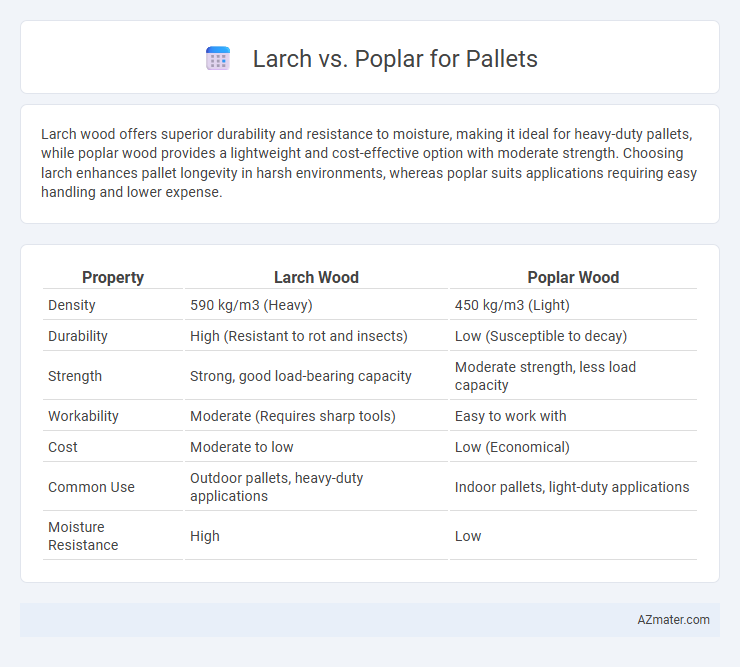Larch wood offers superior durability and resistance to moisture, making it ideal for heavy-duty pallets, while poplar wood provides a lightweight and cost-effective option with moderate strength. Choosing larch enhances pallet longevity in harsh environments, whereas poplar suits applications requiring easy handling and lower expense.
Table of Comparison
| Property | Larch Wood | Poplar Wood |
|---|---|---|
| Density | 590 kg/m3 (Heavy) | 450 kg/m3 (Light) |
| Durability | High (Resistant to rot and insects) | Low (Susceptible to decay) |
| Strength | Strong, good load-bearing capacity | Moderate strength, less load capacity |
| Workability | Moderate (Requires sharp tools) | Easy to work with |
| Cost | Moderate to low | Low (Economical) |
| Common Use | Outdoor pallets, heavy-duty applications | Indoor pallets, light-duty applications |
| Moisture Resistance | High | Low |
Introduction to Larch and Poplar as Pallet Materials
Larch and Poplar are commonly used woods in pallet manufacturing due to their distinct properties. Larch, a durable softwood with high resin content, offers excellent resistance to decay and moisture, making it ideal for heavy-duty, outdoor pallets. Poplar, a lightweight hardwood, provides good strength and smooth surface finish, suitable for pallets requiring moderate load capacity and ease of handling.
Physical Characteristics of Larch vs Poplar
Larch wood exhibits a dense, durable structure with a Janka hardness of approximately 1,370 lbf, making it highly resistant to wear and ideal for pallets that require strength and longevity. Poplar, by contrast, is significantly softer with a Janka hardness around 540 lbf, resulting in lighter, less durable pallets suited for lighter loads and shorter use. The higher density and natural resin content in larch contribute to its superior moisture resistance compared to the more porous and less resinous poplar.
Strength and Durability Comparison
Larch wood exhibits superior strength and durability compared to poplar, making it a preferred choice for pallets that require heavy load-bearing capacity and resistance to wear. Poplar, being a softer hardwood, has lower density and is more prone to dents and damage under stress, which reduces its longevity in pallet applications. Larch's high resin content and natural resistance to decay enhance its durability, offering extended service life in harsh environmental conditions.
Weight and Handling Concerns
Larch wood is denser and heavier than poplar, offering greater strength and durability for pallet construction but resulting in heavier pallets that may be more difficult to handle. Poplar's lighter weight improves pallet maneuverability and reduces shipping costs, making it ideal for applications requiring frequent handling or rapid transportation. Both woods provide sufficient structural integrity, but poplar pallets enhance ease of use while larch pallets maximize load capacity and longevity.
Moisture Resistance and Decay
Larch wood exhibits superior moisture resistance and decay resistance compared to poplar, making it more suitable for pallet construction in humid or outdoor environments. The high resin content in larch enhances its natural durability, minimizing water absorption and prolonging pallet lifespan. Poplar, being a softer and more porous wood, tends to absorb moisture quickly, increasing the risk of decay and structural compromise over time.
Cost and Availability
Larch offers moderate cost and good durability for pallet production but is less widely available than poplar, which is known for its low cost and high availability across many regions. Poplar's lightweight and fast growth contribute to its affordability, making it a popular choice for pallets in industries focused on budget efficiency. The selection between larch and poplar depends largely on balancing cost constraints with the availability demands of pallet manufacturing.
Environmental Impact and Sustainability
Larch pallets offer superior sustainability given their rapid growth rates and natural resistance to decay, reducing the need for chemical treatments and enhancing environmental benefits through carbon sequestration. Poplar wood, while also fast-growing and renewable, tends to require more frequent replacement due to lower durability, leading to higher resource consumption over time. Choosing larch over poplar for pallet production supports longer lifecycle use and minimizes environmental impact by decreasing deforestation pressure and waste generation.
Suitability for Different Pallet Applications
Larch wood offers high durability and resistance to moisture, making it suitable for heavy-duty pallets used in outdoor or industrial environments requiring long-term strength. Poplar wood is lightweight and economical, ideal for disposable or light-load pallets commonly used in retail and short-term shipping applications. Selecting between larch and poplar depends on the specific pallet application requirements such as load capacity, exposure conditions, and lifecycle expectations.
Maintenance and Longevity
Larch wood offers superior durability and natural resistance to decay and insect damage, making it ideal for long-lasting pallets with minimal maintenance requirements. Poplar pallets require more frequent upkeep due to their softer texture and susceptibility to moisture-related issues, resulting in shorter service life. Choosing larch reduces overall maintenance costs and ensures enhanced pallet longevity in demanding environments.
Conclusion: Choosing the Right Wood for Pallets
Larch offers superior durability and resistance to moisture, making it ideal for heavy-duty pallets requiring long-term strength and outdoor use, while poplar is lighter, more affordable, and easier to work with, suited for pallets intended for lighter loads and short-term applications. Understanding the specific load requirements, environmental exposure, and budget constraints is essential in selecting between larch and poplar for pallets. Prioritizing these factors ensures optimal performance, cost-effectiveness, and sustainability in pallet construction.

Infographic: Larch vs Poplar for Pallet
 azmater.com
azmater.com